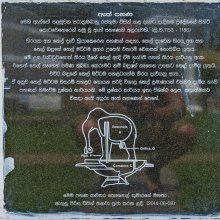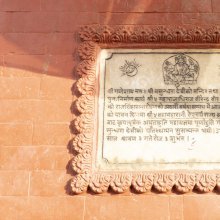Aga, Āga: 19 definitions
Introduction:
Aga means something in Hinduism, Sanskrit, Buddhism, Pali, the history of ancient India, Marathi, Jainism, Prakrit, Hindi. If you want to know the exact meaning, history, etymology or English translation of this term then check out the descriptions on this page. Add your comment or reference to a book if you want to contribute to this summary article.
Alternative spellings of this word include Aag.
Images (photo gallery)
In Hinduism
Ayurveda (science of life)
Nighantu (Synonyms and Characteristics of Drugs and technical terms)
Source: Wisdom Library: Raj Nighantu1) Aga (अग) is synonymous with Mountain (śaila) and is mentioned in a list of 24 such synonyms according to the second chapter (dharaṇyādi-varga) of the 13th-century Raj Nighantu or Rājanighaṇṭu (an Ayurvedic encyclopedia). The Dharaṇyādi-varga covers the lands, soil, mountains [viz., Aga], jungles and vegetation’s relations between trees and plants and substances, with their various kinds.
2) Aga (अग) also refers to a “tree”, as mentioned in a list of twenty-five synonyms in the second chapter (dharaṇyādi-varga) of the 13th-century Raj Nighantu or Rājanighaṇṭu (an Ayurvedic encyclopedia).

Āyurveda (आयुर्वेद, ayurveda) is a branch of Indian science dealing with medicine, herbalism, taxology, anatomy, surgery, alchemy and related topics. Traditional practice of Āyurveda in ancient India dates back to at least the first millenium BC. Literature is commonly written in Sanskrit using various poetic metres.
Ganitashastra (Mathematics and Algebra)
Source: archive.org: Hindu MathematicsAga (अग) represents the number 7 (seven) in the “word-numeral system” (bhūtasaṃkhyā), which was used in Sanskrit texts dealing with astronomy, mathematics, metrics, as well as in the dates of inscriptions and manuscripts in ancient Indian literature.—A system of expressing numbers by means of words arranged as in the place-value notation was developed and perfected in India in the early centuries of the Christian era. In this system the numerals [e.g., 7—aga] are expressed by names of things, beings or concepts, which, naturally or in accordance with the teaching of the Śāstras, connote numbers.

Ganitashastra (शिल्पशास्त्र, gaṇitaśāstra) refers to the ancient Indian science of mathematics, algebra, number theory, arithmetic, etc. Closely allied with astronomy, both were commonly taught and studied in universities, even since the 1st millennium BCE. Ganita-shastra also includes ritualistic math-books such as the Shulba-sutras.
India history and geography
Source: Cologne Digital Sanskrit Dictionaries: Indian Epigraphical GlossaryAga.—(IE 7-1-2), ‘seven’. (SII 3), earth or land. Note: aga is defined in the “Indian epigraphical glossary” as it can be found on ancient inscriptions commonly written in Sanskrit, Prakrit or Dravidian languages.

The history of India traces the identification of countries, villages, towns and other regions of India, as well as mythology, zoology, royal dynasties, rulers, tribes, local festivities and traditions and regional languages. Ancient India enjoyed religious freedom and encourages the path of Dharma, a concept common to Buddhism, Hinduism, and Jainism.
Languages of India and abroad
Pali-English dictionary
Source: BuddhaSasana: Concise Pali-English Dictionaryāga : (m.) mountain; tree.

Pali is the language of the Tipiṭaka, which is the sacred canon of Theravāda Buddhism and contains much of the Buddha’s speech. Closeley related to Sanskrit, both languages are used interchangeably between religions.
Marathi-English dictionary
Source: DDSA: The Molesworth Marathi and English Dictionaryaga (अग).—ind (aṅga S) A familiar vocative particle in addressing a female.
--- OR ---
agā (अगा).—f m ( P Known, acquainted.) Expectation or thought regarding; consideration of as likely to happen. It refers esp. to past time, and requires neg. con. Ex.hyā mahinyānta pāūsa paḍēla hyācī malā agā navhatī. 2 Presence or freshness of mind regarding; clear recollection of. Ex. mī cakalōṃ kharēṃ malā tē vēḷēsa agā rāhilī nāhīṃ. agā m or agō m ghēṇēṃ g. of o. To take the conduct or management of; to take the lead or the initiative. agā bāndhaṇēṃ To forecast; to consider futurity; to provide against.
--- OR ---
agā (अगा).—ind A civil vocative particle in calling to or addressing a male. It is prefixed to the name, or, with elision of a, affixed. 2 This is the plural of agē q. v.
--- OR ---
āga (आग).—f (agni S) Fire. 2 fig. Ardor, heat, burning, glowing. āga pākhaḍaṇēṃ with vara of o. To scatter calumnies concerning. āga righaṇēṃ To immolate herself upon the funeral pyre of her husband--a widow. āga lāgaṇēṃ acc. of s. as dhānyālā-vastrālā To be exceedingly dear. āga lāgō Fire seize it! burn it! āga lāvaṇēṃ To excite a quarrel; to kindle dissension. āga lāvīla āṇi vijhālī kāṃ nāhīṃ jāūna pāhīla Used of a malignant and mischievous fellow who will set people by the ears, and then affect concern about it. āgalāvyā nī bōmba- māṛyā m A term for one who will perpetrate a mischief or an act of wickedness, and then vehemently charge it upon another. āga varasaṇēṃ (To shower down fire.) Used with numerous words, such as pāūsa, ūna, laḍhāī, saṅkaṭa, cōra, and in gen. case as pāvasācī-unācī-laḍhāīcī-saṅkaṭācī-cōrāṃ- cī-āga varasaṇēṃ, signifying To be excessive, intense, intolerable, overwhelming: also with dhānyā- cī-phaḷāñcī-guḷācī-lāḍavāñcī-tupācī-āga varasaṇēṃ To be overflowingly copious or plentiful. āga hātīṃ dharavēla paṇa (hā) hātīṃ dharavaṇāra nāhīṃ Said of a hot-headed, wildly passionate person. āgīnta uḍī ghālaṇēṃ or ṭākaṇēṃ To rush daringly into danger. āgīnta or āgīvara tēla ghālaṇēṃ or ōtaṇēṃ To cast oil upon fire; to add fuel to the flame. āgīvāñcūna dhūra nighata nāhīṃ The waves never rise but when the winds blow. āgīvāṛyācēṃ bhaya (from āga & vārēṃ q. v.) Expresses fear or apprehension of the epidemic cholera. 2 (āga & vārā Wind.) Also āgīvāṛyācē divasa Expressions in constant use in windy weather with reference to scattered grass or rubbish. v hō, lāga, suṭa. kōṇhī āga vhāvē kōṇhī pāṇī vhāvē Men ought to be diverse and multiform: some should be quick and fiery; some should be slow and gentle.
--- OR ---
āgā (आगा).—m The front piece which intervenes betwixt the pēśakaḷī & the khuṇṭakaḷī of an aṅgarakhā.
Source: DDSA: The Aryabhusan school dictionary, Marathi-Englishaga (अग).—ina A vocative particle in addressing a female.
--- OR ---
agā (अगा).—ind A vocative particle in calling to a male.
--- OR ---
āga (आग).—f Fire; fig. heat. āga pākhaḍaṇēṃ Scatter calumnies concerning. āga lāvaṇēṃ Kin- dle; excite a quarrel. āgīnta uḍī ghālaṇēṃ Rush daringly into danger. āgīnta tāvūna kāḍhalēlā Well tested and proved. āgīnta tēla ghālaṇēṃ Add fuel to the flame.
Marathi is an Indo-European language having over 70 million native speakers people in (predominantly) Maharashtra India. Marathi, like many other Indo-Aryan languages, evolved from early forms of Prakrit, which itself is a subset of Sanskrit, one of the most ancient languages of the world.
Sanskrit dictionary
Source: DDSA: The practical Sanskrit-English dictionaryAga (अग).—a. [na gacchatīti; gam-ḍa. na. ta.)]
1) Unable to walk, not going, not in a position to go; अगो वृषलः शीतेन (ago vṛṣalaḥ śītena) P.VI.3.77 Sk. अगजगदोकसामखिलशक्त्यवबोधक ते (agajagadokasāmakhilaśaktyavabodhaka te) Bhāg. 1.87.14.
2) Unapproachable.
-gaḥ 1 A tree; सदानतो येन विषाणिनाऽगः (sadānato yena viṣāṇinā'gaḥ) Śiśupālavadha 4.63.
2) A mountain; ध्वनिरगविवरेषु नूपुराणाम् (dhvaniragavivareṣu nūpurāṇām) Kirātārjunīya 1.4. also a stone; प्रत्यापगं प्रत्यगम् (pratyāpagaṃ pratyagam) Mahānāṭaka.
3) A snake.
4) The sun (na gacchati vakragatyā paścimam, tasya hi vakragatyabhāvo jyotiṣaprasiddhaḥ or, 'not going' the earth by its diurnal rotation causing day and night).
5) A water-jar, as in अगस्त्य (agastya) (kumbhastyāna).
6) The number seven (from the seven kulācalas) cf. ... अथ पन्नगे । नगाः अगाः पर्वतेऽर्के पादपे स्यात् (atha pannage | nagāḥ agāḥ parvate'rke pādape syāt)... ()| Nm.
--- OR ---
Agā (अगा).—a. Ved. Not going.
--- OR ---
Āga (आग).—1 P.
1) To come, come near, approach.
2) To arrive at, attain, reach; fall into (a particular state or condition); आनृण्यमागम् (ānṛṇyamāgam) to become free from debt; so विश्वासम्°, ध्यानम्° (viśvāsam°, dhyānam°) &c.
3) To have recourse to. -Caus. (-gamayati)
1) To cause to come or draw near; तं त्वमा गमयागमे (taṃ tvamā gamayāgame) Av.6.81.2.
2) To lead towards, take, convey; आगमितापि विदूरम् (āgamitāpi vidūram) Gītagovinda 12.
3) To announce the arrival of; राजानमागमयति (rājānamāgamayati) = राजागमनमाचष्टे (rājāgamanamācaṣṭe) Sk.
4) To ascertain, inform oneself about; सर्वमागमयामास पाण्डवानां विचेष्टितम् (sarvamāgamayāmāsa pāṇḍavānāṃ viceṣṭitam) Mahābhārata (Bombay) 5.7.4. प्रज्ञामेवागमयति यः प्राज्ञेम्यः स पंडितः (prajñāmevāgamayati yaḥ prājñemyaḥ sa paṃḍitaḥ) Vop.
5) To learn, acquire, study; सम्यगागमिता विद्या प्रबोधविनयाविव (samyagāgamitā vidyā prabodhavinayāviva) R.1.71; तदप्यागमितं मया (tadapyāgamitaṃ mayā) Mb.; आगमय दण्डनीतिं कुलविद्याम् (āgamaya daṇḍanītiṃ kulavidyām) Daśakumāracarita 155; Mv.5; Si.9.79.
6) (Atm.) To wait for, have patience; आगमयस्व तावत् (āgamayasva tāvat) = क्षमस्व (kṣamasva) Sk. आगमयते कालम् (āgamayate kālam) Vop.
Derivable forms: āgam (आगम्).
--- OR ---
Āga (आग).—a. Accidental, sudden; °त्वम् (tvam) accident, chance.
Source: Cologne Digital Sanskrit Dictionaries: Shabda-Sagara Sanskrit-English DictionaryAga (अग).—m.
(-gaḥ) 1. A tree. 2. The sun. 3. A mountain. 4. A snake. 5. Moving crookedly, twining, twisting E. a neg. and ga who goes, from gama to go, or aga to go tortuously. ac aff.
Source: Cologne Digital Sanskrit Dictionaries: Benfey Sanskrit-English DictionaryAga (अग).—[a-ga], m. 1. A mountain. 2. A tree.
Source: Cologne Digital Sanskrit Dictionaries: Cappeller Sanskrit-English DictionaryAga (अग).—(*[adjective] not moving;) [masculine] tree or mountain.
--- OR ---
Āgā (आगा).—& abhyā come near. approach, get at; befall, visit ([accusative]).
Āgā is a Sanskrit compound consisting of the terms ā and gā (गा).
--- OR ---
Āgā (आगा).—sing to ([accusative]), gain by singing.
Āgā is a Sanskrit compound consisting of the terms ā and gā (गा).
Source: Cologne Digital Sanskrit Dictionaries: Monier-Williams Sanskrit-English Dictionary1) Aga (अग):—[from ag] 1. aga m. a snake [in this sense perhaps rather a-ga] [cf. Lexicographers, esp. such as amarasiṃha, halāyudha, hemacandra, etc.]
2) [v.s. ...] the sun, [cf. Lexicographers, esp. such as amarasiṃha, halāyudha, hemacandra, etc.]
3) [v.s. ...] a water-jar, [cf. Lexicographers, esp. such as amarasiṃha, halāyudha, hemacandra, etc.]
4) [=a-ga] 2. a-ga mfn. (√gam). unable to walk, [Pāṇini 6-3, 77 [Scholiast or Commentator]]
5) [v.s. ...] m. a mountain
6) [v.s. ...] a tree
7) [v.s. ...] the number seven.
8) Agā (अगा):—[=a-gā] mf. ([Vedic or Veda]) not going, [Pāṇini 3-2, 67 [Scholiast or Commentator]]
9) Āga (आग):—= āgas in an-āga q.v.
10) Āgā (आगा):—[=ā-gā] 1. ā-√1. gā -jigāti ([imperative] -jigātu; [Aorist] -gāt, 3. [plural] -guḥ)
—to come towards or into ([accusative]), approach, [Ṛg-veda] etc.;
—to attain, [Śiśupāla-vadha v, 41];
—to overcome, visit (as fear or evil), [Mahābhārata]
11) [=ā-gā] [from ā-gai] 2. ā-gā f. intonation
12) [v.s. ...] singing in a low voice, [Tāṇḍya-brāhmaṇa; ṢaḍvBr.]
Source: Cologne Digital Sanskrit Dictionaries: Goldstücker Sanskrit-English DictionaryAga (अग):—I. [tatpurusha compound] 1. m. f. n.
(-gaḥ-gā-gam) Not going, not mov-ing. 2. m.
(-gaḥ) 1) A mountain.
2) A tree.
3) The sun.
4) A water jar(?).
5) (In arithmetic sometimes used to denote) the numeral seven. E. a neg. and ga. See agaccha, agama and naga. Ii. m.
(-gaḥ) A snake. E. ag, kṛt aff. ac.
--- OR ---
Agā (अगा):—[tatpurusha compound] m. f.
(-gāḥ-gāḥ) Not going. E. a neg. and gā (from gam, kṛt aff. viṭ).
Source: Cologne Digital Sanskrit Dictionaries: Yates Sanskrit-English Dictionary1) Aga (अग):—(ma) agati 1. a. To wind about.
2) (gaḥ) 1. m. A tree; a mountain; the sun; a snake.
3) [a-ga] (gaḥ-gā-gaṃ) a. Unapproachable, unattainable.
Source: DDSA: Paia-sadda-mahannavo; a comprehensive Prakrit Hindi dictionary (S)Aga (अग) in the Sanskrit language is related to the Prakrit words: Aga, Aya.
[Sanskrit to German]
Sanskrit, also spelled संस्कृतम् (saṃskṛtam), is an ancient language of India commonly seen as the grandmother of the Indo-European language family (even English!). Closely allied with Prakrit and Pali, Sanskrit is more exhaustive in both grammar and terms and has the most extensive collection of literature in the world, greatly surpassing its sister-languages Greek and Latin.
Hindi dictionary
Source: DDSA: A practical Hindi-English dictionary1) Aga (अग):—(a) immovable; unintelligible.
2) Āga (आग) [Also spelled aag]:—(nf) fire;—[kā parakālā,—kā putalā] a fire-eater, fire brand, an extremely hot-tempered/hot-headed man;—[khānā aṃgāra haganā] to eat fire, to emit fumes;—[denā] to perform funeral rites; -[para pānī ḍālanā] to pacify/calm down (all infuriated persons);—[para loṭanā] to be uneasy or restless, to be consumed with jealousy, envy etc.; —[pānī/phūsa kā baira] innate mutual hostility;—[phāṃkanā] to boast enormously, to lie grossly; ~[babūlā honā] to be inflamed, to fly in to a rage; —[barasanā] lit. shedding of fire, meaning to have scorching heat (also see—[barasanā]); (for something) to be scarce and expensive; —[barasānā] to bombaid, to cannonate (also see—[barasanā]);—[bhaḍa vānā] to stir or blow the fire (of), to fah the flame (of), to pour oil on fire;—[meṃ kūdanā] to jump into fire, to create troubles for oneself;—[meṃ ghī ḍālanā] to fan the flame, to pour oil on fire; to add fuel to the fire;—[meṃ jhoṃkanā] to thrust into the fire, to put in trouble;—[meṃ pānī ḍālanā] to extinguish the fire, to cause a quarrel to end;—[lagākara tamāśā dekhanā] to excite a quarrel and then to enjoy it;—[lagākara pānī ko dauḍanā]lit. 'to run for water after setting fire to' —meaning, to make show of curing an evil caused by oneself; —[lage para kuāṃ khodanā] to shut the stable door after the horse is stolen; —[se khelanā] to play with fire;—[se khelanā khatare se khālī nahīṃ] it is dangerous to play with edged tools; —[honā] to be furious, to be in a rage, to have one’s blood up.
3) Āgā (आगा) [Also spelled aaga]:—(nm) front, frontage, the fore part of anything; face; the future, the morrow; -[pīchā] pros and cons; •[karanā] to waver, to hesitate;—[bhārī honā] (vulgar) to be in the family way, to be with child.
...
Prakrit-English dictionary
Source: DDSA: Paia-sadda-mahannavo; a comprehensive Prakrit Hindi dictionaryAga (अग) in the Prakrit language is related to the Sanskrit word: Aga.
Prakrit is an ancient language closely associated with both Pali and Sanskrit. Jain literature is often composed in this language or sub-dialects, such as the Agamas and their commentaries which are written in Ardhamagadhi and Maharashtri Prakrit. The earliest extant texts can be dated to as early as the 4th century BCE although core portions might be older.
Kannada-English dictionary
Source: Alar: Kannada-English corpusAga (ಅಗ):—[noun] (used only in composition as in ಅಗಂ [agam]+ , ಅಗ [aga]
--- OR ---
Aga (ಅಗ):—[adjective] not moving; not capable of moving; not walking.
--- OR ---
Aga (ಅಗ):—
1) [noun] a tree.
2) [noun] a hill or mountain.
3) [noun] a snake.
4) [noun] the sun.
--- OR ---
Āga (ಆಗ):—
1) [adverb] then a) at that time; b) in that case.
2) [adverb] always; at all times; at any time.
3) [adverb] ಆಗಾಗ, ಆಗಾಗ್ಗೆ [agaga, agagge] āgāga, āgāgge (dupl.) now and again; often.
--- OR ---
Āga (ಆಗ):—
1) [noun] a wicked act; a moral or religious offence; a sin.
2) [noun] ಆಗಕ್ಕೆ ಭೋಗವೇ ಸಾಕ್ಷಿ [agakke bhogave sakshi] āgakke bhōgavē sākṣi every sin carries its own punishment.
Kannada is a Dravidian language (as opposed to the Indo-European language family) mainly spoken in the southwestern region of India.
See also (Relevant definitions)
Starts with (+1084): A-kamavinai, A-karpaviputi, Aagamanaatmak-samanyikaran, Aagat-satkar, Aga-picha, Agababula, Agabahan, Agabani, Agabhedi, Agabhoga, Agabo, Agabota, Agaca, Agacaruzo, Agacatale, Agacatalu, Agacatlumari, Agacatu, Agaccha, Agacchanta.
Ends with (+2815): Aaga, Abalaga, Abhaga, Abhasaga, Abhayanaga, Abhiparaga, Abhipraga, Abhityaga, Abhraga, Abhranaga, Abhyaga, Abhyupaga, Accaga, Acchaga, Accheraga, Acelaga, Adadandaga, Adaga, Adamsaga, Adamulaga.
Full-text (+478): Agas, Aya, Agatmaja, Anaga, Agam, Niragas, Aga-picha, Ag, Agaja, Kritagas, Agaccha, Agahkrit, Udaga, Akamamaram, Agama, Agkas, Agahkarin, Aranyagana, Agaukas, Agas-moro.
Relevant text
Search found 37 books and stories containing Aga, A-ga, Ā-gā, A-gā, Aagaa, Āga, Agā, Āgā; (plurals include: Agas, gas, gās, Aagaas, Āgas, Agās, Āgās). You can also click to the full overview containing English textual excerpts. Below are direct links for the most relevant articles:
Rig Veda (translation and commentary) (by H. H. Wilson)
Brihad Bhagavatamrita (commentary) (by Śrī Śrīmad Bhaktivedānta Nārāyana Gosvāmī Mahārāja)
Verse 2.4.19 < [Chapter 4 - Vaikuṇṭha (the spiritual world)]
Verse 2.4.253 < [Chapter 4 - Vaikuṇṭha (the spiritual world)]
Verse 2.1.128 < [Chapter 1 - Vairāgya (renunciation)]
Satapatha-brahmana (by Julius Eggeling)
Kāṇḍa XI, adhyāya 5, brāhmaṇa 4 < [Eleventh Kāṇḍa]
Kāṇḍa II, adhyāya 2, brāhmaṇa 2 < [Second Kāṇḍa]
Garga Samhita (English) (by Danavir Goswami)
Verse 1.12.23 < [Chapter 12 - Description of Śrī Nanda’s Festival]
Jainism and Patanjali Yoga (Comparative Study) (by Deepak bagadia)
Part 5 - Jain scriptures and Spiritual teachers < [Chapter 3 - Jain Philosophy and Practice]
Six Essential observances < [Chapter 3 - Jain Philosophy and Practice]
Part 5.5 - Availability of Jain scriptures < [Chapter 3 - Jain Philosophy and Practice]
Sahitya-kaumudi by Baladeva Vidyabhushana (by Gaurapada Dāsa)
Text 11.16 < [Chapter 11 - Additional Ornaments]



